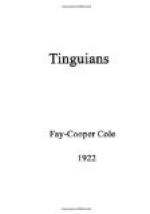When the child is about two years old, a ceremony known as Olog [69] is held. The mediums who are summoned prepare a spirit mat, [70] and at once begin to recite diams over the body of a bound pig. As soon as the animal is killed, its heart is removed, and is rubbed against the breast of each member of the family. The medium then resumes her place at the mat, and soon is possessed by a spirit who takes charge of the proceedings. At his suggestion, the child is rubbed from head to foot with the thread from the medium’s outfit, “so that it will not cry any more;” next, he orders that the intestines of the pig be cleaned, placed on a wooden dish, and be carried to the gate of the town. When they arrive at the designated spot, the mediums make a “stove” by driving three sticks into the ground, so as to outline a triangle, and within these they burn a bundle of rice-straw. Beside the “stove” is placed a branch, each leaf of which is pierced with a chicken feather. This completed, the child is brought up to the fire, and is crowned with the intestines; while one of the mediums strikes the ground vigorously with a split stick, [71] to attract the attention of the spirits. Next, she secures a rooster, and with this in one hand and a spear in the other, she marches five times around the fire meanwhile reciting a diam. At the conclusion of this performance the fowl is killed; and its blood, mixed with rice, is scattered on the ground. At the same time the medium calls to all the spirits to come and eat, to be satisfied, and not cause the child to become ill. The flesh and rice cakes are likewise offered, but after a few moments have elapsed, they are eaten by all the people.
At the conclusion of the meal, a wreath of vines is substituted for the intestines, which are hung beside the fire. This concludes the ceremony; but, as the mother and child reach the ladder of their home, the people above sprinkle them with water, meanwhile calling out eight times, “You are in a heavy storm.” The significance of this sprinkling is not known, but the custom is widespread, and is evidently very ancient.
In the mountain village of Likuan, a man who wears a very large hat takes the child to a nearby saloko. As he returns, he is sprinkled by a medium, who says, “You are wet from the rain; in what place did you get wet?” He replies, “Yes, we are wet from the rain; we were wet in Inakban (a town of the spirits);” then placing two small baskets in the saloko, he carries the child into the dwelling. Soon the father appears and goes about inquiring for his wife and child; suddenly spying the baskets, he seizes them and takes them into the house, saying, “Here are the mother and the child.”




